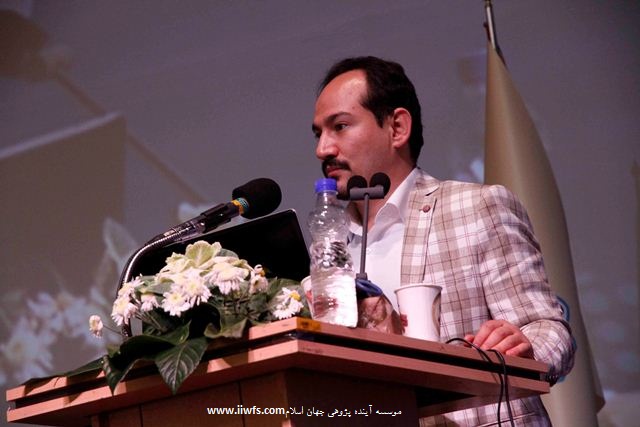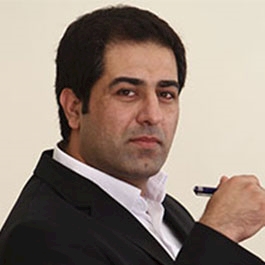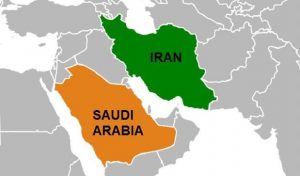Saudi Arabia’s internal trends, as a strategic competitor, should be crucial to us
Dr. Seyed Hamzeh Safavi
Director of Institute for Islamic World Futures Studies
Seyed Hamzeh Safavi, Director of the Institute for Islamic World Future Studies, at the meeting of “An Analysis of Internal Trends of Saudi Arabia” attended by the Middle East scholars and experts on the issue of analyzing the causes, goals and outcomes of some internal reforms in the Saudi government, discussed the formation of the Saudi’s royal government and said: The Saudi government was formed based on the strategic alliance of King Abdul Aziz, using external empowerment factors including the tribal people capacities with Mohammed bin Abdul Wahhab, and internal empowerment factors including capacities of religious beliefs and enriching such beliefs and tribe’s intellectual guidance in Saudi Arabia, and then the third factor, the pact with England, was also added, and these factors created an inclusive and uncontested power trio in the Arabian Peninsula.
Stating that the three sides of the trio has not been stable over the course of history and has had significant downfalls, he mentioned the British colonial purposes in the countries of the region, in particular, the Saudi Arabia, and he argued: “The mere presence of Britain in the region was before the discovery of oil and was because of the colonial rivalry with Portugal, and later on, fearing the establishment of France, and this region did not initially have an inherent attraction for England.“
At that time, Turki bin Faisal bin Al Saud made the best offer to protect the interests of England, so he could win in the intricate internal rivalry between the tribes, therefore an agreement between Britain and Turki bin Faisal bin Al Saud was concluded. At that time, Britain did not seek direct colonialism in the Middle East as it did in India, preferring to benefit from the use of indigenous forces and rulers.
Gradually, particularly after the first and second world wars, when the British economic and military bases were weakened, this country lost its supremacy in the world to the United States in a power play. The important point here has been to provide mutual interests and the mutual need of ultra-regional powers and Saudi rulers to one another which resulted in the United States being replaced as an ultra-regional ally for the Saudis.
He stated the relations between the Saudis and the religious leaders of the country, in order to explain the relations between the two sides of the of power trio in Saudi Arabia, and argued that during the course of history, the religious leaders had repeatedly challenged Saudi rulers on various issues, in general, in opposition to the modernity desired by the Saudis, but the final winner has been the royal government. In general, over the past three centuries, the relationship between these three sides of power trio in Saudi Arabia has witnessed significant changes and ups and downs, but the center of the triangle, which was the royal government, has always been more stable than the other two sides.
Referring to the lack of adherence by Saudi rulers to Islamic law, he stated that the Saudi rulers were not generally subject to the Wahhabi laws and did not see themselves as bound up with Islamic law, especially in regard to recreations, sexual promiscuity with celebrities and non-celebrities (which has raised some scandals on several occasions), as well as the consumption of alcoholic beverages.
The trio of the institution of governance, Wahhabism, and security borrowed from ultra-regional powers have always been intertwined in the contemporary history of Saudi Arabia and House of Saud’s government, but with many challenges and ups and downs. In the analysis of the ups and downs of Saudi Arabia’s dependence on the United States, after September 11, 2011, disagreements began to emerge between the United States and Saudi Arabia that were kept hidden, but after the coming to power of the new Iraqi government which was close to Iran’s government and the fall of Gaddafi In Libya and Mubarak in Egypt, as well as the US-Iran deal in the form of JCPOA, Saudi Arabia has decided to revise its affiliate security policy and to change its regional influence strategies in the region.
Referring to Saudi Arabia’s long-standing dependence on the West, he stated that the basis of the relationship with the West, established by the founders of al-Saud, was on the political support, then food, and later on the basis of broad and effective military support against the rival tribes and the Muslim Brotherhood. But from a point in time, this began the journey of the Saudi Arabian elites’ offspring to the West. In the lunar 1340s, Abdul Aziz sent his son to Egypt and his other son, Faisal, to London, which was seriously criticized by the religious leaders.
Safavi referred to the large population of Saudi students studying in the United States and Europe, and he said that since the year 1340 a significant event has occurred in the field of sending student to the West, and at present, Saudi Arabia has ranked No. 1 among the West Asian countries with the largest population of foreign students studying at the best universities and ranked fourth in the world after China, India and South Korea.
Director of the Institute for Islamic World Future Studies mentioned the cultural, social and political consequences of the return of Saudi students from the universities in the United States and Europe, then he pointed out that this student population, which accounts for more than 10% of the population of Saudi Arabia, has brought experiences of the Western lifestyle, cultural issues, rights demanding, Women’s Rights and Democracy. The wave of alumni returning from abroad, and the spread of mass media via satellite and Internet has created new social outcomes which were accompanied by the new generation and the ambitious young rulers coming to work, led by Ben Salman. The changes along with global pressures, created a significant wave of reforms in Saudi Arabia led by him in the field of human rights, women’s rights, the control of religious extremism and civil and legal freedoms.
Saudi Arabia’s move to domestic reform can be analyzed as the country’s leaders’ attempt to survival, and the events in the region, especially the fall of Gaddafi and Hosni Mubarak, had a clear message to the Saudis that needed reform to survive. Their success or failure in this subject is a matter that only time will tell. But the Saudi attempt to keep pace with globalization is done by some sort of flexibility in domestic law, along with the maintenance of the royal system. Regarding the 2030 vision document in Saudi Arabia, Saudi Arabia has put forward a reform document for 2030 in its agenda, which some of its main objectives includes increased productivity, economic growth, social justice, welfare, diversification in the economy, poverty reduction, the efficiency of the government and … as a macro trend. The government of Saudi Arabia needs reform to survive, with the aim of increasing its legitimacy and efficiency in the domestic and international level, in order to join the macro trend of globalization. Moving towards this process has been done through the formulation and implementation of the top-down document of 2030 vision.
Saudi Arabia began commercialization by reviewing and updating the laws, and it appears in the 2030 document that we will carefully implement the commercial laws and international laws and will create a favorable business environment for long-term investment. We will try to facilitate the movement of people and goods and customs processes in the ports of the country. By doing this, we will create an attractive environment for domestic and foreign investors, and we will get their confidence on the country’s economic potential.
According to the World Bank recommendation, Saudi Arabia has put the promotion of environmental indicators on the agenda through large industrial companies such as Aramco, which is now a pioneer in the region. Saudi Arabia’s most important goals in the area of networking are becoming the network and the way of communication between the three continents of Europe, Asia and Africa, and the creation of a network of public and private companies to promote the health of the community and an integrated network of research, manufacturing and development of military industries for domestic consumption and exporting IT network promotion.
The young age of Bin Salman and his experience of living in the West, as well as his ambition, along with the pressure of Saudi public opinion, the expansion of the mass media and the Internet, and the cultural changes of traditional Saudi society, the return of alumni or graduates from abroad and the demands of comparison with advanced countries, the global pressures of reform in Saudi Arabia made Ben Salman an important decision. Ultimately, a big decision was made for deep surgery within the Saudi traditional system by him. Achieving this result required an exact expertise and a schedule that was beyond the potentiality of expertise in Saudi Arabia. Therefore, he has been working on a major reform project in Saudi Arabia, with the help of the best Western consulting agencies. In 2016, the revealed number by Western media for the right to consult Western companies is 1.3 billion dollar, which is a huge number. An increase of 12 percent compared with last year boosted the speculation that the Saudi Arabia’s 2030 document would be handed over to the accredited Mackenzie Institute, whose output resulted in the drafting of and drawing up the document.
These conditions will make major changes in the near future of Saudi Arabia, which will undoubtedly affect Saudi relations with Iran. Therefore, recognizing, observing and evaluating these changes is essential. Experts have different views on how to transform Saudi Arabia’s global strategies towards globalization. Some believe that this process depends on Bin Salman, and its success and failure is in power of Bin Salman power position.
In practice, Saudi Arabia will face serious difficulties in implementing this document, and this document is unlikely to succeed. Falling behind the document in the year 2018, as well as the reforms and revisions in it, confirms this. In practice, globalization will lead to the fall of Al Saud and their values from the realm of power. These changes include the wave of democracy, civil liberties outside of the Saudi law and Islamic law, as well as the free press.
We should note and consider that Saudi Arabia’s achievement of the 2030 document, even if it is delayed for many years, will have a major impact on the regional status of Saudi Arabia in the regional and global competitions, and therefore the trends of this country as a strategic competitor of Iran should constantly being monitored and evaluated.
** This article is originally published in Persian and translated by Fateme Esmaelzad**





